Surgeon Q&A: What Are 8 Important Facts About Calcified Heart Valves?
Written By: Adam Pick, Patient Advocate, Author & Website Founder
Medical Experts: Michael Borger, MD and Joseph Lamelas, MD
Page Last Updated: June 6, 2025
I’ll never forget when my cardiologist said to me, “Adam, The calcium on your valve is causing serious problems. Your valve is stenotic. You need a new valve.” In that moment, I was overwhelmed with emotions and… questions. Some of the questions were, “What do you mean calcium on the valve?” and “What is stenosis?” and “OMG! Do I really need heart surgery?”
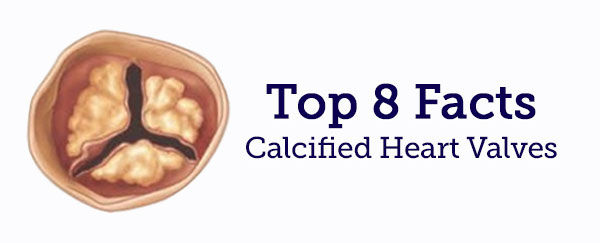
Ten years after surgery, I’m thrilled to report that my aortic valve replacement is doing great. That said, I receive a lot of excellent questions from our community about heart valve calcification. So, I wanted to create a special post dedicated to this very important topic.
To get the latest research about heart valve calcification, I contacted two cardiac surgeons that specialize in heart valve therapy – Dr. Michael Borger and Dr. Joseph Lamelas.
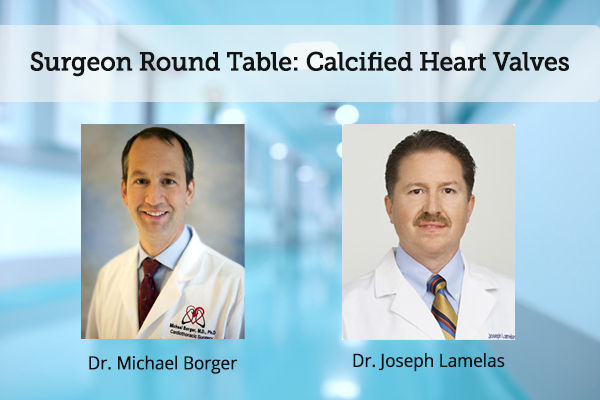
1. What is a calcified heart valve?
Dr. Borger Says: A calcified heart valve is one in which a large amount of calcium has been deposited over many years. Heart valves are normally formed of leaflets that are thin and pliable. When a heart valve becomes calcified, the leaflets become stiff and the valve eventually becomes narrowed (“stenotic”). The stenotic heart valve in turn leads to increased resistance to blood flow and increased cardiac work.
2. How does a heart valve get calcified?
Dr. Lamelas Says: There are multiple reasons that valves calcify. One particular reason is attributed to the normal wear and tear of the heart valves because of the fact that the heart is the hardest working muscle in the body. In addition, there can be genetic reasons which include congenital valve abnormalities where the valve stiffens later in life. Other factors that contribute to calcification include smoking, diabetes, chronic kidney disease and elevated cholesterol and triglyceride levels. Most valves become calcified by atherosclerosis, which is a process that causes blockages in the arteries of the heart as well as the rest of the body.
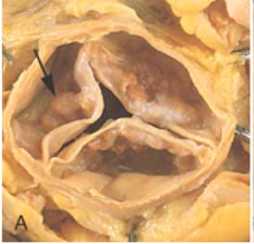
An inflammation can occur on the heart valve that leads to a reaction in the blood stream which promotes calcification. Despite all these potential reasons, the exact mechanism causing heart valve calcification is still being investigated. Other causes of aortic valve calcification or valve stiffening include radiation exposure to the chest and rheumatic aortic valve disease.
3. Can each of the four heart valves get calcified?
Dr. Lamelas Says: The left sided heart valves (aortic and mitral) are usually the valves that calcify. The aortic valve, which is the main valve or the “front door of the heart”, regulates all of the blood that leaves the heart and is the valve that calcifies most frequently. It is very unusual for the right- sided heart valves (tricuspid and pulmonary) to calcify and it is not really clear why.
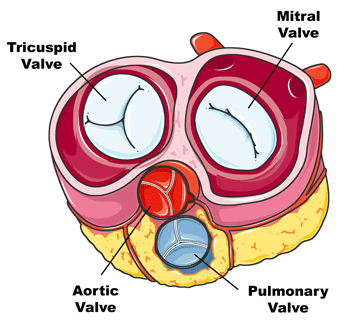
When the aortic valve calcifies, it affects both, the valve leaflets (doors) and the annulus (the ring on which the valve sits). When the mitral valve calcifies, it mainly affects the annulus (ring) but can also involve the leaflets. The most common disease that causes mitral valve calcification is rheumatic valve disease. This typically occurs when a streptococcal throat infection affects the valve during youth but will not become evident until adolescence or adulthood.
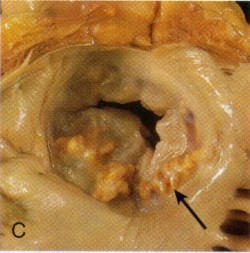
Dr. Borger Says: Calcium deposits are more commonly found in areas of turbulent blood flow, which is more commonly found at the aortic valve in its position between the left ventricle and the aorta. Bicuspid aortic valves (BAV) and other valve anomalies result in particularly turbulent blood flow, which is why these patients present with valve calcification at a much earlier age. BAV disease is the most common congenital cardiac anomaly, occurring in 1-2% of the general population.
4. How does a calcified heart valve impact patients?
Dr. Borger Says: Once the calcification and valve stenosis become severe, patients will develop increasing shortness of breath on exertion. Lightheadedness and chest pain are other common symptoms.
Dr. Lamelas Says: Patients that have had long standing calcification of the heart valves may also develop heart enlargement as well as a thickened heart muscle. Contrary to the skeletal muscle in the rest of our body, heart muscle enlargement or thickening will negatively affect the heart. All of these consequences will limit a patient’s quality of life as well as long term survival.
Dr. Borger Says: In rare circumstances, patients with severe aortic valve stenosis may suffer from cardiac arrest or sudden death. The likelihood of this occurring, however, is very low in patients who have not yet developed symptoms. Such symptoms are usually quick to resolve after valve replacement surgery.
5. How are calcified heart valves treated?
Dr. Lamelas Says: A valve replacement is indicated in patients where the calcium on the valve progresses to the point where its function is impaired and ultimately causing symptoms. There are 2 broad categories of replacement valves – mechanical and bio-prosthetic. Mechanical heart valve replacements are usually made of a metal material. Bio-prosthetic heart valve replacements are made of animal tissue, either cow or pig.
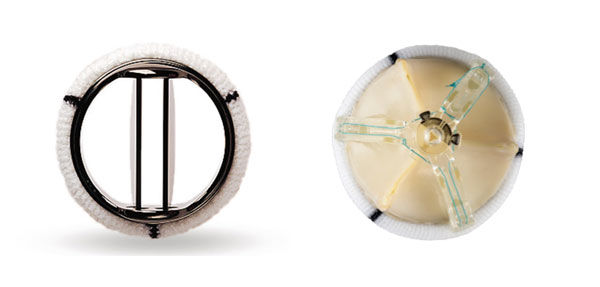
The heart valves can be replaced with a surgical approach which can be performed in the conventional manner by opening the sternum (breast bone) or by a minimally invasive approach through a small incision on the side of the chest. In both of these procedures, the heart chamber is opened and the diseased valve is completely removed and a new valve is implanted.
Another option now available in selected patients with aortic valve stenosis is a trans-catheter aortic valve replacement (TAVR). In these procedures, the valve is most commonly delivered into the patient’s diseased aortic valve through an artery in the leg or arm. The diseased valve is not removed and the patient does not need to be placed on the heart lung machine.
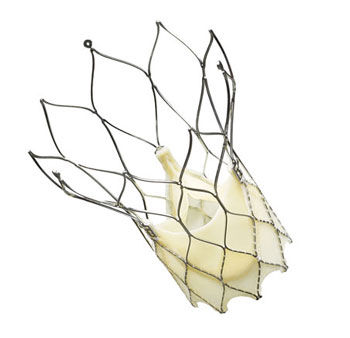
Dr. Borger Says: Older, high risk patients with aortic stenosis are currently treated with transcatheter aortic valve replacement (TAVR), a revolutionary procedure that is usually performed through the groin and without the use of cardiopulmonary bypass.
6. If a calcified valve is replaced, can it get calcified again?
Dr. Lamelas Says: Yes. Bio-prosthetic valves that are implanted in young patients as well as those on dialysis have a greater chance of calcifying earlier. The natural stress on the valve from wear and tear can also lead to calcification and degeneration of the artificial valve. No one really knows exactly why these valves calcify but 2 theories exist. One is related to the way that the valves are treated or preserved with a chemical called glutaraldehyde which attracts calcium. The other may be an immune reaction that the body has to the artificial animal valve. On the other hand, metal or mechanical valves do not calcify, but they can fail when the doors of the valve become impaired, limiting its opening and closing. This can occur when clots form on the valve or when a thick tissue growth (pannus) develops underneath the valve.
7. We’ve heard that some of the new heart valve replacement devices have “anti-calcification” technologies like the Linx AC from St. Jude Medical. Can you talk about those technologies? How do they prevent calcification?
Dr. Borger Says: Almost all of the current generation of biological valves have some form of anti-calcification treatment. Most of them, including Linx AC, work by preventing the binding of calcium molecules to fat molecules on the valve leaflets. Such anti-calcification treatments appear very effective in bench side and animal studies. However, long-term follow up of patients provides the best evidence of anti-calcification effectiveness. That is one of the reasons why academic cardiac surgery centers are so interested in carefully following patients over time.
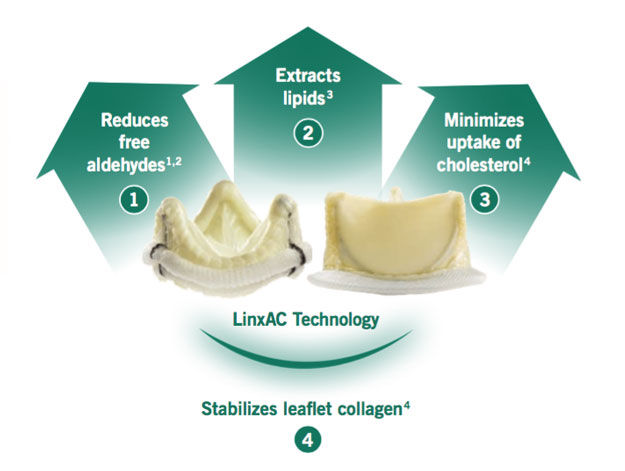
Dr. Lamelas Says: The main goal of all bio-prosthetic valve manufacturers is to develop a valve that does not calcify. As I mentioned previously, a chemical called glutaraldehyde is used to treat these valves. This chemical helps sterilize the valve, decreases its immune reaction and helps make the valve more durable. Despite its benefits, glutaraldehyde does promote calcification of the valve. Many companies have been working on different ways to limit this process. The Linx technology is one of these. It consists of treating these artificial valves with chemicals that reduce the effect that the glutaraldehyde has on the formation of calcium as well as decreasing the amount of cholesterol and lipids that form on the valves.
8. Is there anything else you feel patients should know about calcified heart valves? Any tips for preventing heart valve calcification?
Dr. Borger Says: This is a frequent question of patients, “What can patients do to prevent heart valve calcification?” Unfortunately, there is no known method by which someone can slow the calcification process in his or her heart valves. Once the problem is diagnosed, however, regular follow up with a cardiologist is recommended. In addition, referral to a surgeon should be done promptly in patients who develop symptoms of shortness of breath, chest pain, or lightheadedness.
Dr. Lamelas Says: A patient that has calcium on a heart valve should be followed carefully by their cardiologist. They should undergo echocardiograms (heart ultrasounds) on a yearly or even 6 month interval. If they develop symptoms, the echocardiogram should be performed sooner. Careful follow up and subsequent timely treatment when necessary, will allow for the lowest risks with any intervention, whether it be a surgical or transcatheter replacement. An educated patient living a healthy lifestyle will always have the best quality of life.
I hope that helped you learn more about heart valve calcification. I know it helped me. On behalf our community, I’d like to extend a humongous “Thank You!!!!” to Drs. Borger and Dr. Lamelas for sharing their clinical experiences and research with our community on this very special topic.
Related Links:
- Mitral Annular Calcification: Why Is It Tough To Treat?
- Stroke Risk & Heart Valve Calcification: What Should Patients Know?
Keep on tickin!
Adam
|
nancy rouch says on September 16th, 2016 at 7:03 am |
|
Doesn’t taking Vit K -MK7 prevent this building up of calcium? This what my Functional Medicine MD has told me to take. Do calcium supplements for bone loss cause calcification of valves? |
 |
|
Adam says on September 16th, 2016 at 12:59 pm |
|
Hi Nancy, Here’s some great information about the use of supplements, calcium, heart valves and arteries from Dr. Gillinov – http://www.heart-valve-surgery.com/heart-surgery-blog/2012/08/10/vitamin-k2-blocked-arteries-calcified-leaflets/. |
 |
|
DivaDebra says on September 16th, 2016 at 2:36 pm |
|
Thank you Adam! |
 |
|
Sandy Wummer says on September 16th, 2016 at 7:15 pm |
|
What about human valves? i received one 3 years ago at age 58 due to surgical endocarditis 12 weeks after a bioprosthetic replacement for aortic valve bicusp. It is hard to obtain info on durability and track records on those. Any info? Love the journals. The support offered there got me through some very rough times. |
 |
|
Joroja says on September 17th, 2016 at 11:33 am |
|
Dr. Lamelas performed my aortic/mitral replacements 2 1/2 yrs ago. My calcification apparently due to radiation for childhood cancer. Thankful and grateful. Doing wonderfully now. Interesting info vitamin k2…. |
 |
|
jane says on September 18th, 2016 at 11:54 am |
|
My husband had a tavr fitted he is 55 he could not have a pigs value because his aortic value was too calcified he has a gene that creates too much colestrol in his body can anyone tell me how long this tavr is going to last thanks |
 |
|
Adam says on September 18th, 2016 at 1:01 pm |
|
Fantastic Joroja!!!! Many patients in our community have had great results with Dr. Lamelas. Glad to hear you’re one of them!!! Keep on tickin! Adam |
 |
|
Adam says on September 18th, 2016 at 1:05 pm |
|
Glad to hear you are lovin’ the journals (http://www.heart-valve-surgery.com/journals/) Sandy! Fyi, I received a homograft 10 years ago. It’s doing great! Durability for most tissue valves is between 10-15 years. Hopefully, with the new anti-calcification technologies, like the Linx AC (http://bit.ly/2cgmM0C), that number will increase. Fingers crossed! |
 |
|
Adam says on September 18th, 2016 at 1:07 pm |
|
Great to hear from you Debra!!!! So happy your son’s experience with Dr. Borger (http://www.heart-valve-surgery.com/surgeons/dr-Michael-Borger-New+York+City-New%20York.php) was excellent. He’s a great guy who has always made the time to help educate our community. |
 |
|
Adam says on September 18th, 2016 at 1:10 pm |
|
Good question Jane. No definitive duration data on TAVR yet as the technology is still relatively new — especially here in the US. For those unfamiliar with TAVR, here’s a lotta information for you at http://www.heart-valve-surgery.com/tavr-procedure.php/. |
 |
|
PRPhillips says on September 21st, 2016 at 6:21 pm |
|
My husband was just diagnosed with calcified heart valves and regurgitation. After 6 months of chemo therapy the symptoms of this appeared. We believed the fatigue and shortness of breath would go away after a few months of recovery as did the team of medical professionals following his care. After several months we realized his symptoms were not going away, but getting worse. We requested an appointment with a pulmonologist thinking that the chemo drugs had somehow damaged his lungs. The doctor ordered an Echocardiograph that revealed the cause of my husbands shortness of breath was not lung damage, but calcified heart valves with accompanied regurgitation. I found your website today and am going to share it with my husband. Thank you for providing a place and community where those of us who find ourselves in a similar circumstance can get educational and emotional support. P.S. My husband is a 9 year survivor of an entire dissected descending aorta which should have taken his life immediately. So, we are extremely grateful he lived long enough to even have additional problems. |
 |
|
jane says on September 29th, 2016 at 2:04 pm |
|
Thanks I have read your information but would like more do you know how long it will take for the tavr to calcified again ?? |
 |
|
nancy rouch says on October 16th, 2016 at 9:46 am |
|
I would be very interested in learning about the gene that creates too much cholesterol. I have a lot of snps in my genes, I have AR & AS, no surgery yet but feel it is getting close. |
 |
|
jane says on October 16th, 2016 at 12:20 pm |
|
Hi nancy my husband has pcsk9 gene this means his liver creates too much cholestrol you can google it aswell jane |
 |
|
nancy rouch says on October 16th, 2016 at 12:52 pm |
|
Thank you so much Jane. I hope your husband is doing well now. Best. |
 |
|
jane says on October 17th, 2016 at 1:08 pm |
|
Thanks nancy hes doing ok for now but as I have said we don’t know how long this tavr will last so we just enjoy everyday best we can x |
 |
|
Pandey Dharmendra says on November 4th, 2016 at 7:48 am |
|
Hello, |
 |
|
ramgbs says on December 27th, 2016 at 12:30 am |
|
great op. Bob M |
 |
|
compassn says on July 14th, 2017 at 12:16 am |
|
I’m interested in the answers of your questions. I hope you get a reply even though a lot of time has passed. |
 |
|
Tony Mento says on July 14th, 2017 at 3:33 pm |
|
I am new to this forum. I would like to know what the basic requirements are for eligibility for the TAVR procedure. I am 65 and in fairly good condition. About 6 months ago I was diagnosed with severe aortic stenosis. I had my first followup appointment with my cardiologist yesterday and he says that I need to do something sooner rather than later. I would like to have the least evasive procedure because I am concerned about recovery time. I need it as short as possible for fear of job loss. Any information would be greatly appreciated. Thanks |
 |
|
eva ga says on September 10th, 2017 at 5:03 pm |
|
Hello, I am 37 and have cow aortic valve ( edwards) for 2 years. Already 6 months after op my numbers showed it calcifies. Now my index is 0.8 and have strong murmur which I can hear/feel myself.. It will probably has to be replaced soon like within 2 years. Why? And what do I do? I do not want mech valve, I feel like I can not bear it |
 |
|
Helen Booth says on February 22nd, 2018 at 4:46 am |
|
Hi I am i8n the same position but have the choice of the Inspiris resilia supposed to last longer and resist calcification |
 |
|
eva ga says on February 22nd, 2018 at 10:35 am |
|
Helen, it is so hard and doctors do not help. They might know ( blood characteristic, imunity characteristic, etc) but they dont say more. It is up to us. |
 |












